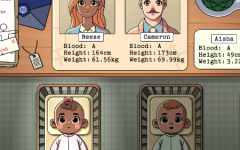Advertisement
Diapers, Please!
Advertisement

Diapers, Please! places the player in a quietly unsettling role within a system that’s already broken. Set in an alternate version of the 1920s, the game casts you as the sole person responsible for reuniting newborns with their parents after a fire destroys all birth records in a state-run maternity facility. With only fragments of data—physical traits, blood types, and scribbled notes—you’re expected to piece families back together in a society where error is not just punished, but recorded. The work feels simple on the surface, but each decision slowly begins to carry emotional weight.
Observation Over Action
Instead of typical action or movement, Diapers, Please! is built entirely around observation. You sit at a desk reviewing baby records, interpreting parent files, and spotting inconsistencies in the data. Some clues are straightforward; others are obscured by bureaucracy or distorted by fear. The longer you work, the more you notice patterns, outliers, and the cracks in what was once presented as a clear process. The player becomes both detective and bureaucrat—trapped in a system where intuition is discouraged but often necessary.
A World in Quiet Collapse
Everything in Diapers, Please! feels slightly off. The setting is painted in muted tones, the user interface resembles an old filing system, and the ambient audio blends mechanical noises with distant murmurs. These details aren’t meant to distract—they quietly reinforce the atmosphere of pressure and moral compromise. As cases grow more difficult, hints of the outside world creep into your workspace. You start to sense that the assignment of a baby is never just administrative—it’s political, emotional, and sometimes irreversible.
Hidden Dilemmas Behind Each File
There are no overt story branches, but every choice matters. Matching a baby with the wrong family may go unnoticed by the system, or it may lead to subtle narrative changes later. Some files hint at stories the game never explains—parents who seem to be hiding something, or children who don’t fit the system’s assumptions. The game invites players to read between the lines and decide whether accuracy, empathy, or survival matters most.
What Defines Diapers, Please!
- Paperwork-based gameplay focused on matching families
- Emotionally layered decision-making without overt storytelling
- A stylized, era-specific setting that shapes tone and pressure
- Multiple outcomes based on small, quiet choices
- Designed to question trust, routine, and the consequences of obedience
Diapers, Please! is not a loud game. It doesn’t punish or reward in obvious ways. Instead, it offers slow-building tension and moments of quiet reflection, where every match you make feels like placing a name in a book that someone else will read later—and judge you for.






















































































































































